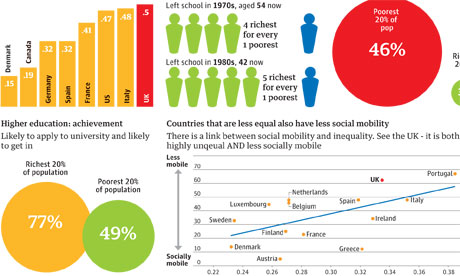You can read the stats from the article at http://www.guardian.co.uk/news/datablog/2012/may/22/social-mobility-data-charts - a sample follows below:
Here's what the figures show:
• Britain has some of the lowest social mobility in the developed world - the OECD figures show our earnings in the UK are more likely to reflect our fathers' than any other country
• Social mobility hasn't changed since the 1970s - and in some ways has got worse. For every one person born in the 1970s in the poorest fifth of society and going to university, there would be four undergrads from the top fifth of society. But if you were born in the 1980s, there would be five
• 24% of vice-chancellors, 32% of MPs, 51% of top Medics, 54% of FTSE-100 chief execs, 54% of top journalists, 70% of High Court judges …went to private school, though only 7% of the population do
• Education is an engine of social mobility. But in the UK, achievement is not balanced fairly - for the poorest fifth in society, 46% have mothers with no qualifications at all. For the richest, it's only 3%
• Parental influence still makes a big difference to a child's education in the UK, especially compared to other countries - in fact in the UK the influence of your parents is as important as the quality of the school - unlike Germany, say, where the school has a much bigger role
Click on the image for the full chart
• Higher education is not evenly balanced either in terms of aspirations - 81% of the richest fifth of the population think their child will go to university, compared to 53% of the poorest
• … or achievment: 49% of the poorest will apply to university and get in, compared to 77% of the richest
• There is a strong link between a lack of social mobility and inequality - and the UK has both. Only Portugal is more unequal with less social mobility
• If you are at the top, the rewards are high - the top 1% of the UK population has a greater share of national income than at any time since the 1930s

No comments:
Post a Comment
All comments are vetted